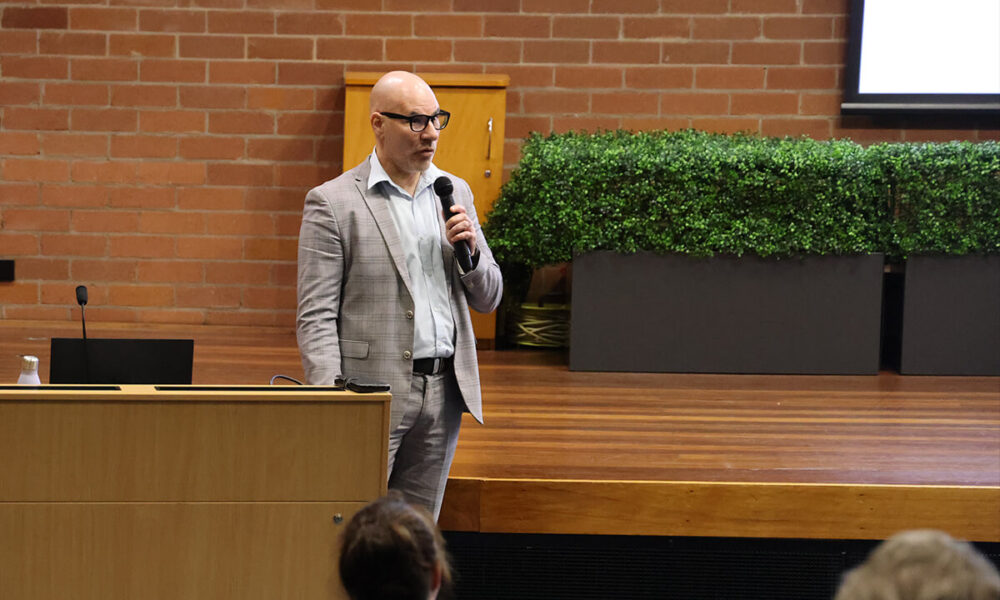
Partnering with Parents
Respect and Consent and Navigating Digital Identity
As part of Shore’s comprehensive K-12 Respect and Consent programme, we were privileged to host Dr Marshall Ballantine-Jones last Wednesday evening for a parent presentation and Q&A session. Dr Ballantine-Jones is the author of the DigiHelp programme, which is currently being implemented in Year 7 and Year 9 PDHPE lessons this year. His work focuses on helping young people navigate identity, relationships, and the impact of digital media, particularly pornography and sexualised content.
The DigiHelp programme offers age-and-stage-relevant activities and conversations, guided by our excellent PDHPE teachers. Lessons focus on respectful relationships, consent, and challenging assumptions about harmful online material. Boys are encouraged to reflect deeply on their digital habits and the messages they receive through social media and other platforms.
The beginning of the presentation included some very alarming statistics around gender-based violence; tragic and awful realities that require deep reflection. These included findings that 58 percent of young women experience gender-based violence, including sexual harassment, assault, or online abuse, and that one in five women aged 18 to 24 have experienced stalking since the age of 15. Dr Ballantine-Jones went on to discuss major contributing factors to hyper-sexualised attitudes and negative behaviours in young men, such as early exposure to pornography, mass media sexualisation, social media, and narcissism. He highlighted the role of super stimuli, including pornography, social media, and gaming, as powerful influences that shape negative behaviours among young people.
Some key insights from the presentation include the following sobering statistics:
- By age 15, 70 percent of boys will view porn regularly.
- The average age of first viewing pornography is 11.5 to 12.5 years old.
He also unpacked the neurological impact of doom scrolling, where young people spend hours viewing short videos on social media sites, explaining how the brain is saturated in dopamine and how it can lead to addiction and wasted hours for young people.
A related and powerful takeaway: “You become what you dwell on”. This statement challenged us as educators and parents to consider how digital content shapes behaviour, character and relationships.
Some excellent practical advice for parents was offered. Dr Ballantine-Jones presented five key strategies:
- Break Online Cycles – Teens need more non-screen activities. Delay access, set boundaries, and use tools like Custodio for parental controls on school devices. Most importantly, have the conversation—build trust and set clear expectations.
- Parent Well – Strong relationships are foundational. His advice: “Talk early. Talk often. Talk well.”
He addressed the social cost of exclusion for boys not on social media and encouraged open dialogue.
- Consider Peer Power – Know your son’s friends. Peer influence is the engine room of behaviour. Affirm identity and work with partner bodies—schools, clubs, churches—to provide positive role models.
- Promote Belonging – Shore’s rich offering of co-curricular activities fosters a strong sense of belonging and positive role modelling. A vital counterbalance to online toxicity.
- Consider Christian Sexual Ethics – Even for families not regularly attending church, Dr Ballantine-Jones recommended values of forgiveness, redemption, and mutual love. He urged parents to help boys resist mass media’s distorted messages about sexuality and identity.
We encourage parents to view the presentation recording and slides and to reach out with any questions or concerns. As always, we thank you for partnering with us in the pastoral care of your sons and for supporting this important work.
For more information about the DigiHelp programme or Shore’s Respecting Consent curriculum, please contact Mr Derek Champion, Deputy Head of Pastoral Care.
Mr Derek Champion
Deputy Head of Pastoral Care
